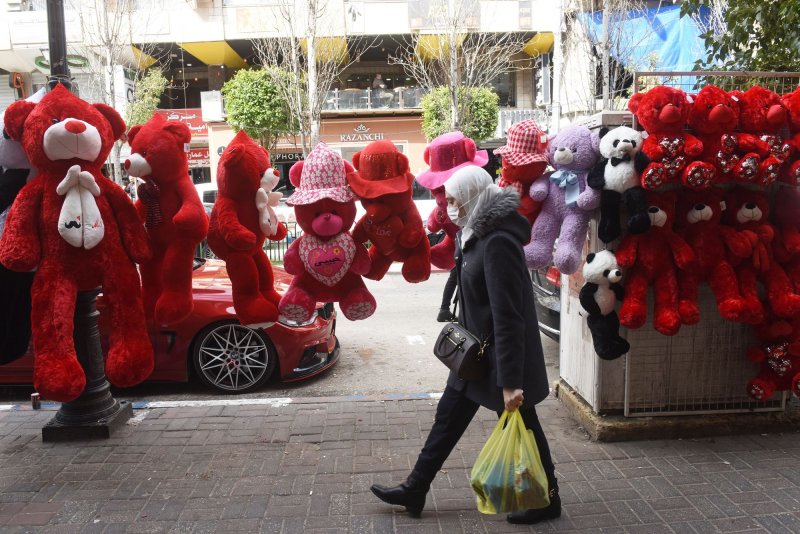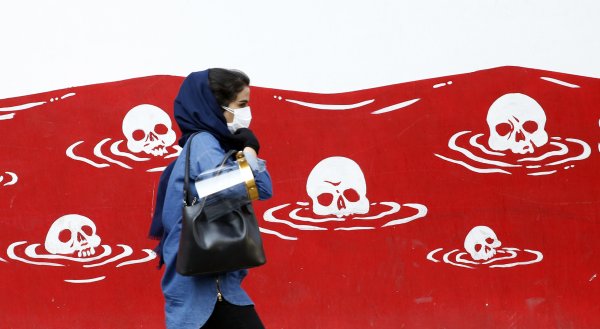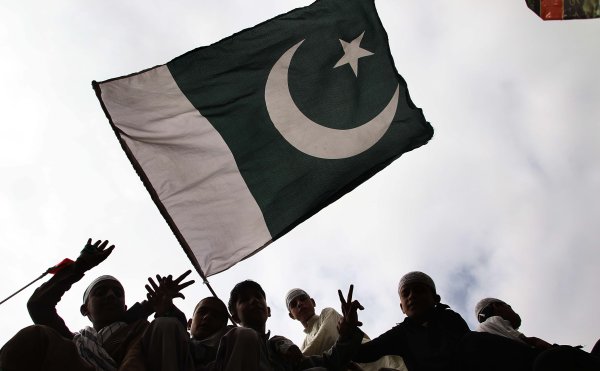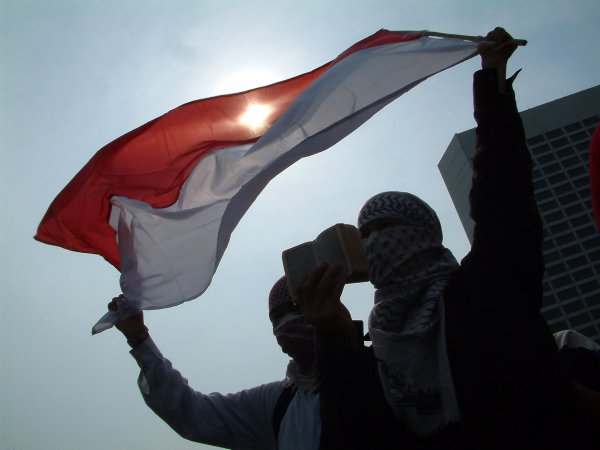
A Palestinian walks past red bears displayed outside a store on Valentine's Day in Ramallah, West Bank, on Monday.
Photo by Debbie Hill/UPI | License Photo
Feb. 14 (UPI) -- Tens of millions of people will commemorate Valentine's Day on Monday, which is a day of celebrating romance throughout most of the world -- but religious and cultural differences mean that the holiday is banned in a handful of countries.
Pope Gelasius is credited with officially establishing Valentine's Day in honor of St. Valentine of Rome, a priest who was martyred in 269 and was said to have secretly married Roman soldiers and restored eyesight to his jailer's daughter and sent her a letter that was signed "Your Valentine" before he was executed.
Throughout history, the holiday began to be more singularly associated with themes of love and romance, including in Britain where the holiday was connected to love birds of the spring.
Despite its evolving nature, some countries -- many with majority Muslim and Hindu populations -- have sought to eliminate the celebration due to its Christian origins and some moral objections.
Here are five countries where Valentine's Day is prohibited, or at least unloved:

People are seen at a beach in Penang, Malaysia. File Photo by Stephen Shaver/UPI
Malaysia
In Malaysia, where about 60% of the population is Muslim, the National Fatwa Council moved to ban the holiday in 2005, stating that it has "elements of Christianity."
The council has also linked the holiday to abortion, consumption of alcohol and other activities that it believes invite moral decay -- particularly among young people.
Christian groups have urged the council to reconsider, stating that there's little connection between modern Valentine's Day and Christianity.
The ban, however, has persisted and couples who celebrate can face penalties, including arrest.

An Iranian woman walk past a wall with an anti-American painting on the wall of the former U.S. Embassy in Tehran, Iran. File Photo by Abedin Taherkenareh/EPA-EFE
Iran
In 2011, the Middle Eastern and Muslim-majority country banned the production of all goods and gifts associated with Valentine's Day -- and outlawed promotion of any day celebrating romantic love, which is seen as a sign of immorality and the spread of Western culture.
A pair of ancient festivals have effectively taken the place Valentine's Day in Iran.
Sepandarmazgan on Feb. 23 is known as the Persian day of love and honors Spandarmand, a Zoroastrian deity who represents a loving wife.
The other is the festival of Mehrgan, which is observed in early October. It celebrates the concept of Mehr, which can mean friendship, love and affection.

Uzbekistan, a landlocked nation in central Asia, is a breakaway country that declared its independence in 1991 after the fall of the Soviet Union. File Photo by Richard Tomkins/UPI
Uzbekistan
The former Soviet republic allowed Valentine's Day celebrations for many years, but its Ministry of Education's Department of Enlightenment and the Promotion of Values issued an internal decree a decade ago that forbids celebrating holidays that are "alien to our culture."
Valentine's Day celebrations are not illegal in the country, but the country prefers to celebrate Babur, a Mughal Emperor and descendent of Genghis Khan, who was born on Feb. 14.
Uzbekistan is a secular nation, but the majority of its citizens are Muslim.

Pakistan's high court moved five years ago to dissuade citizens from observing Valentine's Day. File Photo by Shahzaib Akber/EPA
Pakistan
Home to the world's largest Muslim population, Pakistan moved to ban any celebrations, media coverage or mention of Valentine's Day in 2017 following a petition to the High Court in Islamabad.
The primary reason for the move was because Valentine's Day is a Western cultural import that went against the teachings of Islam.
A year earlier, then-President Mamnoon Hussain called on Pakistanis to avoid Valentine's Day, saying it "has no connection with our culture."
The decision did not go over well with flower sellers and university students, and some still celebrate the holiday in secret.

Citizens hold the national flag during a demonstration in downtown Jakarta, Indonesia. UPI Photo/File
India and Indonesia
Valentine's Day is not banned in India or Indonesia, but it has faced pushback from radical religious groups in both countries.
In India, Hindu nationalists have protested the holiday, while threatening and attacking couples who celebrate -- including cutting their hair or blackening their faces.
Some groups have employed anti-Valentine's Day campaigns on social media, and a far-right Hindu political party in 2015 threatened to force people making public displays of love on social media on Feb. 14 to get married.
A ruling by the highest Islamic Council in 2012 -- declaring that Valentine's Day was contradictory to Muslim culture and teaching -- has led to small-scale bans of the holiday in the Indonesian cities of Surabaya and Makassar and an outright ban in Bando Aceh.
However, the holiday is still observed in other parts of the country and is openly celebrated in the capital, Jakarta.
Feb. 14 (UPI) -- Tens of millions of people will commemorate Valentine's Day on Monday, which is a day of celebrating romance throughout most of the world -- but religious and cultural differences mean that the holiday is banned in a handful of countries.
Pope Gelasius is credited with officially establishing Valentine's Day in honor of St. Valentine of Rome, a priest who was martyred in 269 and was said to have secretly married Roman soldiers and restored eyesight to his jailer's daughter and sent her a letter that was signed "Your Valentine" before he was executed.
Throughout history, the holiday began to be more singularly associated with themes of love and romance, including in Britain where the holiday was connected to love birds of the spring.
Despite its evolving nature, some countries -- many with majority Muslim and Hindu populations -- have sought to eliminate the celebration due to its Christian origins and some moral objections.
Here are five countries where Valentine's Day is prohibited, or at least unloved:

People are seen at a beach in Penang, Malaysia. File Photo by Stephen Shaver/UPI
Malaysia
In Malaysia, where about 60% of the population is Muslim, the National Fatwa Council moved to ban the holiday in 2005, stating that it has "elements of Christianity."
The council has also linked the holiday to abortion, consumption of alcohol and other activities that it believes invite moral decay -- particularly among young people.
Christian groups have urged the council to reconsider, stating that there's little connection between modern Valentine's Day and Christianity.
The ban, however, has persisted and couples who celebrate can face penalties, including arrest.

An Iranian woman walk past a wall with an anti-American painting on the wall of the former U.S. Embassy in Tehran, Iran. File Photo by Abedin Taherkenareh/EPA-EFE
Iran
In 2011, the Middle Eastern and Muslim-majority country banned the production of all goods and gifts associated with Valentine's Day -- and outlawed promotion of any day celebrating romantic love, which is seen as a sign of immorality and the spread of Western culture.
A pair of ancient festivals have effectively taken the place Valentine's Day in Iran.
Sepandarmazgan on Feb. 23 is known as the Persian day of love and honors Spandarmand, a Zoroastrian deity who represents a loving wife.
The other is the festival of Mehrgan, which is observed in early October. It celebrates the concept of Mehr, which can mean friendship, love and affection.

Uzbekistan, a landlocked nation in central Asia, is a breakaway country that declared its independence in 1991 after the fall of the Soviet Union. File Photo by Richard Tomkins/UPI
Uzbekistan
The former Soviet republic allowed Valentine's Day celebrations for many years, but its Ministry of Education's Department of Enlightenment and the Promotion of Values issued an internal decree a decade ago that forbids celebrating holidays that are "alien to our culture."
Valentine's Day celebrations are not illegal in the country, but the country prefers to celebrate Babur, a Mughal Emperor and descendent of Genghis Khan, who was born on Feb. 14.
Uzbekistan is a secular nation, but the majority of its citizens are Muslim.

Pakistan's high court moved five years ago to dissuade citizens from observing Valentine's Day. File Photo by Shahzaib Akber/EPA
Pakistan
Home to the world's largest Muslim population, Pakistan moved to ban any celebrations, media coverage or mention of Valentine's Day in 2017 following a petition to the High Court in Islamabad.
The primary reason for the move was because Valentine's Day is a Western cultural import that went against the teachings of Islam.
A year earlier, then-President Mamnoon Hussain called on Pakistanis to avoid Valentine's Day, saying it "has no connection with our culture."
The decision did not go over well with flower sellers and university students, and some still celebrate the holiday in secret.

Citizens hold the national flag during a demonstration in downtown Jakarta, Indonesia. UPI Photo/File
India and Indonesia
Valentine's Day is not banned in India or Indonesia, but it has faced pushback from radical religious groups in both countries.
In India, Hindu nationalists have protested the holiday, while threatening and attacking couples who celebrate -- including cutting their hair or blackening their faces.
Some groups have employed anti-Valentine's Day campaigns on social media, and a far-right Hindu political party in 2015 threatened to force people making public displays of love on social media on Feb. 14 to get married.
A ruling by the highest Islamic Council in 2012 -- declaring that Valentine's Day was contradictory to Muslim culture and teaching -- has led to small-scale bans of the holiday in the Indonesian cities of Surabaya and Makassar and an outright ban in Bando Aceh.
However, the holiday is still observed in other parts of the country and is openly celebrated in the capital, Jakarta.
No comments:
Post a Comment